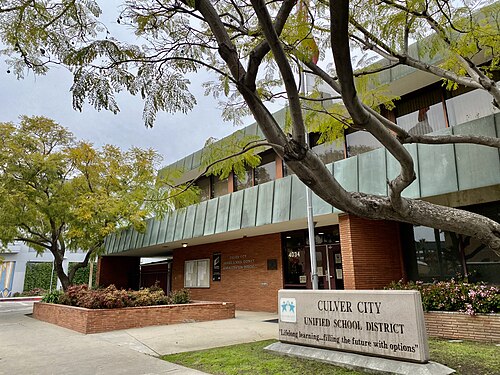
At the April 22, 2025 meeting of the Culver City Unified School District, public concerns focused on three major issues: the district’s elimination of honors English classes for underclassmen at Culver City High School, a proposed staff cut at El Marino Language School, and a community-led campaign to rename the high school’s baseball field after longtime coach Rick Prieto.
During the public comment period for items not on the agenda, community members addressed these topics one by one.
Elisabeth Butler, a parent with two daughters at El Marino, urged the board not to eliminate the position of Principal Assistant Jennifer Servin. “Assistant principal Jennifer Servin is essential to the day-to-day functioning of the school. She provides leadership support to students, teachers and staff… Cutting her position will have an immediate impact on our school,” Butler said. Eight additional El Marino parents followed, echoing Butler’s concerns and emphasizing Servin’s importance to the school.
Longtime Culver City High School staff member and retired athletic director Tom Salter asked the board to consider renaming the CCHS baseball field in honor of Rick Prieto, a former coach. Salter, who worked at the school for 27 years, was joined by 14 others, including Prieto’s daughter, current CCHS teachers, alumni from the class of 1974, and parents of former players, all supporting the proposal.
Benicio Mora-Fattorini, Culver City’s representative to the California High School Democrats Cabinet, shifted the focus to academics, advocating for the reinstatement of honors English classes in the 9th and 10th grades. He pointed to backlash from parents and students following the district’s 2022 decision to eliminate honors English for freshmen and sophomores. The district replaced the two-tiered system with a single “College Prep” track, which some educators and counselors believe creates more equitable opportunities for students who may not have previously enrolled in honors courses.
In a public statement, CCUSD said: “In fall 2022, Culver City Unified transitioned from a two-tiered system of ‘Honors and Non-Honors’ to ‘College Prep’ classes-for-all in our 9th and 10th grade English courses.”
During the comment period for agenda items, Dr. Balatayo — who teaches both English Language Development (ELD) and AP Language and Composition — voiced support for the current model. “Instead of putting English Learners into separate tracks, support them by establishing a newcomer program at CCUSD,” she said, arguing that such a program would affirm that English Learners deserve the same opportunities as their more privileged peers.
Kalena Tamura, who teaches 9th grade English College Prep and previously taught English 9 Honors, said the curriculum remains rigorous. “My current lesson plans are not identical to when I taught honors, but that’s only because I’m a better teacher today than I was four years ago,” she said.
Numerous parents spoke in favor of bringing back the honors/non-honors English class structure, saying their children are bored in class, the curriculum lacks rigor, and students feel totally unprepared to take Advanced Placement (AP) courses.
Dr. Baxter presented data comparing ninth grade English performance from the 2021–22 school year (when honors and non-honors tracks existed) to 2024–25 (under the College Prep model). The data showed a 15% increase in the number of students who finished the course. However, the board struggled to interpret whether the shift increased AP course enrollment. The figures were duplicative — students enrolled in more than one AP course were counted multiple times — making it difficult to assess actual student participation.
Board member Lindsay Carlson responded skeptically. “I can’t tell you based on these numbers that [the change] caused an increase among any population. It looks like it decreased overall when the honors course went away.”
Board member Andrew Lachman agreed that the data lacked clarity. “There’s a correlation in data between increases in sales of organic food and incidents of autism. It doesn’t mean they’re connected,” he said. Lachman emphasized that while more students might be taking AP courses, that doesn’t prove the College Prep model caused the change. Instead, he credited efforts to encourage economically disadvantaged students to challenge themselves academically.
Board member Brian Guerrero added that the data fails to show whether students in AP courses are succeeding. He also shared that English teachers believe differentiation — tailoring instruction to students’ needs — is happening in classrooms. “Differentiation may not hit every single student, but it is certainly not a one-size-fits-all class,” he said.
Board member Stephanie Loredo warned against coded language creeping into the debate. “Where we start to have a red flag is when folks are coming to the podium and they’re saying, ‘I’m all for equity and those students deserve their choice, but they don’t deserve to be with my student.’ You’re holding my student back.”
Loredo suggested exploring additional curriculum options to support passionate students, such as a Women’s Literature class.
School Board President Triston Ezidore, said removing the honors track has shown little change in outcomes. “Why English honors?” he asked. “Tracking happens much before we get to high school. We know it happens in Pre-K.” He called for a deeper conversation about what educational equity should look like in practice.
Clara Carvalho
